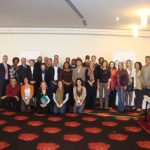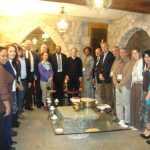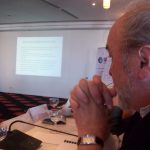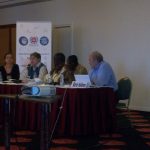Beirut, Libano – 22 al 26 de Noviembre del 2010 – Reunión del GPPAC
Del 22 al 26 de Noviembre del 2010 se llevo a cabo en Beirut la reuniónes de GPPAC(Global Partnership for the Prevention of Armed Conflict) de Regional Laison Officers y del International Steering Group. Los Regional Laison Officers cumplen la función de vinculo entre el Global Secretariat y las regiones, coordinando entre ambos para la elaboración y ejecución de los planes regionales y globales. El International Steering Group esta compuesto por el Global Secretariat y Regional Secretariats de 15 regiones que integran el GPPAC en conjunto con otros miembros no regionales. El International Steering Group es el ente que gobierna al GPPAC y se reúne cada 12 meses. En este caso la reunión tuvo como objetivo definir sobre la restructuración que ECCP (European Centre for Conflict Prevention) y GPPAC están llevando a cabo. Dentro de las múltiples reuniones que se realizaron en ese tiempo también se hicieron visitas guiadas a un campo de refugiados Palestinos, a la misión de Naciones Unidas UNIFIL y se concretaron reuniones con varios representantes políticos locales. Esta experiencia permitió tener una aproximación a los problemas que confronta el Líbano así como el resto de la región. También dejo en claro la importancia del dialogo y la prevención de conflictos para evitar el resurgimiento de los problemas que hace décadas que afectan a la zona.
Antes de finalizar las reuniones también se elaboraron dos declaraciones. Una sobre el Líbano y una segunda sobre la actual tensión en la Península Coreana.
- EXPERIENCING LEBANON
Lebanon is part of the cradle of civilization, and a country with a long history as a convener of dialogue processes related to both internal and regional conflicts. Many of these undertakings, both on a political and community level, resulted in great successes.
Today, Lebanon stands at a cross-roads where there is both potential for a turn to an inclusive and all encompassing process of dialogue that could support building sustainable peace or a new escalation of violence. The use of war or violence as a means to settle conflicts has not and will not bring stability nor peace to the country.
GPPAC in Lebanon
Every year some 40 peace builders from around the world come together to develop their strategies and plans to work on conflict prevention and peace building. The meeting represents the Global Partnership for the Prevention of Armed Conflict (GPPAC), a world-wide civil society network that believes that through cooperation, exchange and solidarity it is possible to make a difference. This year the group gathered from 22-26 November in Beirut, Lebanon and made use of the opportunity to visit and meet with different leaders, organisations and institutions in the country.
The group was welcomed by the President of Lebanon, General Michel Suleiman, represented by the Minister of Displaced, Akram Chehayeb during a reception, and addressed by Mr. Fadi Abi Allam, representing GPPAC’s local host, the Permanent Peace Movement; its Chair, Mr. Emmanuel Bombande from Ghana; and its Honorary Chair, Mr. Paul van Tongeren from the Netherlands.
The next day the group divided itself in three delegations, which each visited different parts of the country.
One of the delegations visited two of the Palestinian refugee camps, Burg Baragneh and Mar Elias. Part of the visits was a roundtable meeting, with both Palestinian and Lebanese non-governmental organisations that work in the camps. Later, the group also had the chance to meet with the PLO leadership. The day gave the delegation a strong appreciation of the untenable situation the Palestinian refugees have already lived in for over sixty years.
Another delegation had the chance to visit Southern Lebanon starting with crossing the Litani river, where the group was joined by secretary-general Fadlallah Hassouna of local civil society organisation, the DPNA Assembly. Following that, they visited several villages on the southern border, stopping at Edeyssey-Fatima gate-Maroun el Rass and Houla village. The group was welcomed at the office of the Kaemakam of Merjeyoun, Wissam Jamil Hayek, and later joined by the mayor of Khiyam, Abbas Awada and the mayor of Bourj El Molouk, Sulaiman Sulaiman, as well as by UNIFIL Captain Aranda, head of the unit of civil-military relations. This led to an open discussion, amongst others on both the appreciation and criticism of the over 30 years presence of UNIFIL in the region.
Finally, a delegation had the opportunity to meet with several leaders of some of the different political parties in Lebanon. Starting with Lebanon’s former President and current President of the Lebanese Social Democratic Party (Al-Kataeb) Amin Gemayel at his mansion in Bikfaya. This was followed by a meeting with Member of Parliament Ghassan Moukheiber, member of the Change and Reform Bloc. The group subsequently had the chance to engage with Minister Hussein Hajj Hassan, as representative of Hezbollah, at his office at the Ministry of Agriculture. They closed the day with a visit to former Prime Minister Fouad Siniora.
From Wednesday through to Friday 26 November, the group had its International Steering Group meeting, where plans, structures and strategies were discussed and decided for the coming five years.
Closing the week with a press conference, through which GPPAC hopes to share it experiences and impressions of Lebanon with the media in an attempt to contribute to the public and political debate in the country and support Lebanon in establishing the peace and stability it so rightfully deserves.
Reflecting on Lebanon
Reflecting on its visit to Lebanon, GPPAC realizes how much the country has suffered from violence and war. In engagements with different local actors, GPPAC observed and recognized the need to expand dialogue that is sustainable and inclusive to all segments of society.
GPPAC furthermore believes that, although Lebanon is a prosperous country, several communities within its borders are in dire need of recognition of the tragic humanitarian situation they find themselves in. They also have the right to a significant increase in assistance in their development. The different communities need to be heard and be given a chance to voice their hopes to participate in building a peaceful Lebanon.
GPPAC also observed the enormously complex and fragile security situation that dominates the country which makes people live in a constant state of fear. This is caused by the possibility of renewed conflict and violence, something which is currently exemplified by the speculations regarding the outcome of the Special Tribunal for Lebanon.
All of these reflections brings GPPAC to call for;
The recognition of justice as a very important element of sustainable peace, while considering the potential implications of the outcome of the Special Tribunal for Lebanon; and for all stakeholders in Lebanese society to communicate openly about the Tribunal but to refrain from violence in responding to its outcome,
The acknowledgement of the human needs and rights of the Palestinian Refugees, as well as to give them a voice in deciding their own future,
The UNIFIL mission of peacekeeping needs to be continued, while hearing the concerns of local populations in the South regarding the mission and the UN in general.
To contribute to these developments, GPPAC hopes to support peace in Lebanon by;
Assisting and supporting the strengthening of an internal dialogue process in Lebanon, amongst others by sharing its knowledge and experience with dialogue processes in other areas of the world.
Being a messenger to international actors that influence the security and stability of Lebanon to express the shared need for an inclusive dialogue process.
Beirut, Lebanon – 26 November 2010
- GPPAC Northeast Asia Statement for Peace on the Korean Peninsula
We, the undersigned members of civil society organizations, are shocked at the artillery exchange between North and South Korea on November 23, 2010, that caused the tragic killing of and injuries to the people of Yeonpyeng Island. We extend our deepest condolences to the families of all those who lost their lives and to the communities affected. We categorically condemn the attack that caused the tragedy, no matter what background there might be for the respective governments.
We are also gravely concerned about the developments after the incident. The tension caused through military activities and provocative behaviour among policy makers and even the public is growing. While we understand the emotions behind these reactions, an escalation of tension would only lead to further violence and confrontations. We must ease tensions, and work together to find creative, peaceful solutions. Dialogue is the only way to proceed. The people of Northeast Asia should be united in calling for peace.
We hereby call on all the governments and people concerned to commit to the following:
1. Stop military activities now.
A ceasefire must be declared by North and South Korea immediately. Military exercises in and around the area are counterproductive and should be stopped. All the parties must refrain from any acts that increase tension in the region.
2. Work to start dialogue.
The governments of North and South Korea must arrange diplomatic talks as soon as possible, and other governments should work to make such talks a success. Regional dialogue should also be pursued, including an early resumption of the Six-Party Talks.
3. Investigate the incident.
Attention should be paid to the fact that the area of this incident has long been disputed between North and South Korea. All the parties should therefore have fully refrained from provocation and military actions. International investigation needs to be carried out to clarify exactly what happened.
4. Do not start an arms race.
No government should use this event as an excuse for military build-up or an increase of military expenditure. Build-up of military capability would not prevent conflicts, but rather trigger an arms race. An arms race would not only deprive the people in need of their limited resources, but also risk additional confrontations. Regional cooperative
disarmament measures and security arrangements should instead be developed.
5. Create and expand Demilitarized Zones.
We call on the governments of North and South Korea to work to establish a Peace and Cooperation Zone in the West Sea/Yellow Sea as agreed in the Joint Statement of the North-South Summit of October 4, 2007, with a view to preventing conflicts in the area. We further call for the creation and expansion of Demilitarized Zones (DMZs) in other disputed areas in the region. In such zones, military activities, including exercises, should be prohibited, and confidence-building measures such as dialogue and transparency programs should be implemented.
6. Civil society has a critical role to play.
Civil society actors such as NGOs, academic institutions and the media can play a critical role to facilitate the processes outlined above. Governments should allow and encourage them to play their legitimate roles. The media has a special responsibility to refrain from any provocation. Rather, the media should promote a balanced analysis and facilitate dialogue.
This tragic incident reminded us of the fact that our region is still divided and suffering from the remnants of the Cold War. More than half a century since the armistice was declared in the Korean War, a peace regime needs to be realized on the Korean Peninsula, along with a peace mechanism in Northeast Asia as a whole. Recalling the North-South Declarations of June 15, 2000, and October 4, 2007, and the Joint Statement of Six-Party Talks of September 19, 2005, we call on the
governments concerned to make further efforts, and reaffirm our commitment to strive to achieve these goals.
December 2, 2010
Initial Signatories:
ANDO Hiroshi, Nonviolent Peaceforce, Tokyo
HUANG Haoming, China Association for NGO Cooperation, Beijing
HSU Szu-chien, Institute of Political Science, Academia Sinica, Taipei
Meri JOYCE, GPPAC Northeast Asia Regional Liaison Officer, Tokyo
JUNG Gyung-Lan, Women Making Peace, Seoul
KAWASAKI Akira, Peace Boat, Tokyo
Anton KOSTYUK, Maritime State University, Vladivostok
LEE Jae Young, Korea Anabaptist Center / Northeast Asia Regional Peacebuilding Institute, Seoul
LEE Taeho, People’s Solidarity for Participatory Democracy (PSPD), Seoul
Kathy R. MATSUI, Hague Appeal for Peace Global Campaign for Peace Education, Tokyo
SASAMOTO Jun, Japan International Lawyers Solidarity Association (JALISA), Tokyo
SHEN Dingli, Fudan University, Shanghai
YI Kiho, Hanshin University, Seoul
YOSHIOKA Tatsuya, GPPAC Northeast Asia Regional Initiator / Peace Boat, Tokyo
*This statement was drafted and initially signed by the members and affiliates of Global Partnership for the Prevention of Armed Conflict (GPPAC) Northeast Asia Regional Steering Group, and made open for endorsements.
*Affiliations are for identification purposes only.




